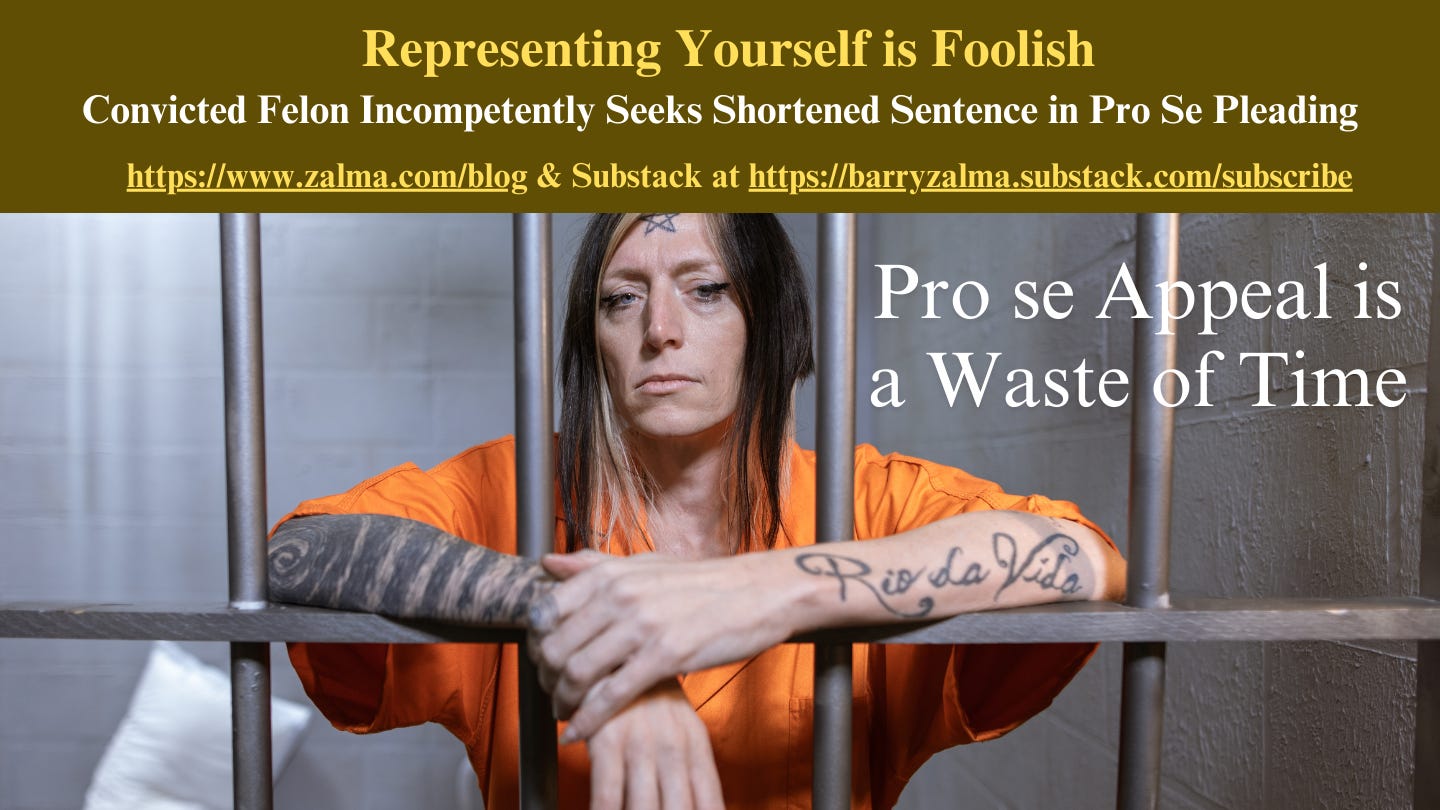Post 4856
Read the full article at https://lnkd.in/gXj9W6AD, see the full video at https://lnkd.in/gaMSX9eV and at https://lnkd.in/g2wqG6DN, and at https://zalma.com/blog plus more than 4850 posts.
Rameeza S. Chowdhury (“Chowdhury”) appealed as her own attorney from the order dismissing her petition pursuant to the Post Conviction Relief Act (“PCRA”) and must serve the full sentence.
Rameeza S. Chowdhury (“Chowdhury”) appealed as her own attorney from the order dismissing her petition pursuant to the Post Conviction Relief Act (“PCRA”) and must serve the full sentence.
In Commonwealth Of Pennsylvania v. Rameeza S. Chowdhury, No. 1491 MDA 2023, No. J-S19027-24, Superior Court of Pennsylvania (August 8, 2024) Chowdhury’s attempt to get out of jail was found to have been made without an appropriate basis and incompetently.
FACTS
Berks Psychiatry (“BP”), a medical office headed by Doctor Mohammed Khan resulted in the arrest and conviction of Ms. Chowdhury. Before her arrest the Commonwealth received information that patients could walk into BP and receive prescriptions for certain controlled substances with little if any medical examination. A search warrant was executed on October 16, 2012, resulting in the seizure of numerous records and approximately seven million dollars in cash. Dr. Khan unlawfully prescribed approximately 145,000 pills from January 1, 2012, through October 16, 2012.
Chowdhury, BP’s office manager, was charged as an accomplice to Dr. Khan with respect to prescribing three controlled substances (Xanax, Adderall, and Ritalin). In addition, the Commonwealth filed several charges particular to Chowdhury as a principal, which encompassed fraudulent billing, racketeering, perjury, and hindering prosecution. Medicare would be billed for separate visits on different dates, i.e., one day with the therapist and one day with Dr. Khan, when, in reality, the patients saw both persons on the same day. Several BP witnesses testified that Chowdhury ordered the alterations.
THE SENTENCE
After a non-jury trial on March 8, 2017, the trial court convicted Chowdhury of three counts of unlawful administration of a controlled substance by a practitioner, two counts of corrupt organizations, and one count each of conspiracy, perjury, insurance fraud, and hindering prosecution. The trial court sentenced Chowdhury to an aggregate term of six to eighteen years of imprisonment to be followed by two years of probation. Chowdhury did not appeal.
On June 6, 2019, Chowdhury timely filed a pro se PCRA petition, her first.
Chowdhury presented the following two questions for consideration:
1 Whether Chowdhury is guilty by association for drug crimes when she was employed by a medical doctor as an office manager.
2 Whether the Commonwealth met its burden of proof in overcoming the protections of statutes which confer additional immunity from guilt by association for those good faith office manager employees of medical professionals who were convicted of drug crimes incidental to government overreach, subject to counsel review?
ARGUMENT
Chowdhury argued that she is “not guilty as a matter of law” because as officer manager, she performed administrative duties and “had nothing to do with drug crimes.” Couched within the first issue, Chowdhury also argued that the Commonwealth did not prove she constructively possessed drugs because “office managers do not dispense drugs.”
Chowdhury concluded, without expounding, that counsel missed this law and its immunizing effect, ineffectively.
CONCLUSIONS
The appellate court concluded that no relief was due on any of Chowdhury’s claims.
First, Chowdhury failed to raise these issues in her PCRA petition. Accordingly, all of Chowdhury’s issues were waived on this basis.
A petitioner cannot raise issues in a PCRA petition that have been previously litigated or waived. Chowdhury’s claims all center around her argument that she cannot be held criminally liable because she was merely an office manager who worked under the direction of Dr. Khan, which was previously litigated on direct appeal. Chowdhury’s claims are, therefore, ineligible for PCRA relief.
To establish an ineffectiveness of counsel claim, a petitioner must prove: (1) The underlying claim has arguable merit; (2) no reasonable basis existed for counsel’s actions or failure to act; and (3) appellant suffered prejudice as a result of counsel’s error such that there is a reasonable probability that the result of the proceeding would have been different absent such error.
Because Chowdhury did not develop this issue, let alone prove the inadequacy, the appellate court concluded it was also waived.
ZALMA OPINION
It is axiomatic that the person who represents herself in court has a fool for a client and is a foolish litigator to take on such a difficult task. Chowdhury failed totally, made an enemy of a court appointed lawyer who withdrew and then totally failed in her attempts to represent herself to the appellate court, proving the axiom correct. The crime she, and her employer, Dr. Khan committed was evil rather than medicinal and she will now serve the six to eighteen years in prison.
(c) 2024 Barry Zalma & ClaimSchool, Inc.
Please tell your friends and colleagues about this blog and the videos and let them subscribe to the blog and the videos.
Subscribe to my substack at https://barryzalma.substack.com/subscribe
Go to X @bzalma; Go to Newsbreak.com https://www.newsbreak.com/@c/1653419?s=01; Go to Barry Zalma videos at Rumble.com at https://rumble.com/account/content?type=all; Go to Barry Zalma on YouTube- https://www.youtube.com/channel/UCysiZklEtxZsSF9DfC0Expg
Go to the Insurance Claims Library – https://lnkd.in/gwEYk

















